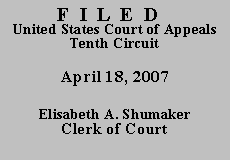

| RONNIE BRUSCINO,
Plaintiff - Appellant, v. MICHAEL V. PUGH; E.J. GALLEGOS; JENNIFER GRUNDY; |
|
Bruscino is an inmate of the United States Penitentiary Administrative Maximum ("ADX") in Florence, Colorado. He claims that ADX employees have taken his mail and personal property, and allowed inmate informants to examine his mail as part of a scheme to manufacture charges against him. In support of his First Amendment Bivens claims, Bruscino alleges the following: (1) In July 2000, Randy Watson opened a piece of Bruscino's legal mail and gave it to inmate informants to read, delaying its delivery until August 1, 2000; (2) Sometime after August 2000, Watson, Dan Schoff, E.J. Gallegos, and Michael Pugh allowed inmate informants to read Bruscino's mail; (3) Schoff improperly rejected Bruscino's outgoing mail in September 2001; (4) "John Doe" Collins and Gallegos refused to allow Bruscino to correspond with other ADX inmates, preventing him from obtaining affidavits; (5) In November 2000 "John Doe" Grisby did not allow Bruscino to receive a news article from his attorney, and opened a letter from his attorney outside Bruscino's presence; and (6) Pugh and Jennifer Grundy knew of and acquiesced in the allegedly unconstitutional conduct described above. Bruscino also seeks damages under the FTCA for prison officials' alleged destruction and confiscation of his personal property.
A magistrate judge recommended Bruscino's FTCA claim be dismissed for lack of subject matter jurisdiction. The FTCA's limited waiver of sovereign immunity does not extend to claims "arising in respect of the . . . detention of any goods, merchandise, or other property by any officer of customs or excise or any other law enforcement officer." 28 U.S.C. § 2680(c). Concluding that prison officials constitute "other law enforcement officer[s]," the magistrate judge recommended holding that sovereign immunity robbed the court of jurisdiction.
The magistrate judge also recommended that summary judgment be granted against Bruscino on his Bivens claims. She noted that Bruscino's primary evidence suggesting that defendants had opened his mail was inadmissible hearsay. Although it appeared that the August 2000 letter had been opened prior to Bruscino's receipt of it, there was no evidence of an improper motive behind the opening. She concluded that a three-week delay in mail delivery, without any indication of improper motive, did not rise to the level of a constitutional violation. See Smith v. Maschner, 899 F.2d 940, 943-44 (10th Cir. 1990).
Regarding Bruscino's claim that Schoff improperly refused to send his September 2001 mail, the magistrate judge recommended a finding that the letter contained information intended for another inmate. She recommended dismissing this claim because regulating inmate-to-inmate communication is "reasonably related to legitimate penological interests." Turner v. Safley, 482 U.S. 78, 89 (1987).
The magistrate judge also recommended ruling that Bruscino had no right to procure statements from other inmates because he was not (at that point) involved in any pending legal proceedings. See 28 C.F.R. § 540.17. Finally, as to the claims regarding Grisby, the magistrate judge recommended finding that the restriction of the newspaper article in question was also "reasonably related to legitimate penological interests." Turner, 482 U.S. at 89.
Over Bruscino's objections, the district court adopted the magistrate judge's recommendation in full and dismissed Bruscino's case. Bruscino now appeals.
"We review the district court's grant of summary judgment de novo, applying the same legal standard that should have been used by the district court." Rivera v. City & County of Denver, 365 F.3d 912, 920 (10th Cir. 2004) (quotation and alteration omitted). Summary judgment is appropriate "if the pleadings, depositions, answers to interrogatories, and admissions on file, together with the affidavits, if any, show that there is no genuine issue as to any material fact and that the moving party is entitled to a judgment as a matter of law." Fed. R. Civ. P. 56(c). Having carefully reviewed the parties' briefs, the record on appeal, and the pertinent law, we AFFIRM the judgment of the district
court for substantially the reasons stated in the February 21, 2006, recommendation of the magistrate judge.
Entered for the Court
Circuit Judge
*. After examining the briefs and appellate record, this panel has determined unanimously that oral argument would not materially assist the determination of this appeal. See Fed. R. App. P. 34(a)(2); 10th Cir. R. 34.1(G). The case is therefore ordered submitted without oral argument. This order and judgment is not binding precedent, except under the doctrines of law of the case, res judicata, and collateral estoppel. It may be cited, however, for its persuasive value consistent with Fed. R. App. P. 32.1 and 10th Cir. R. 32.1.